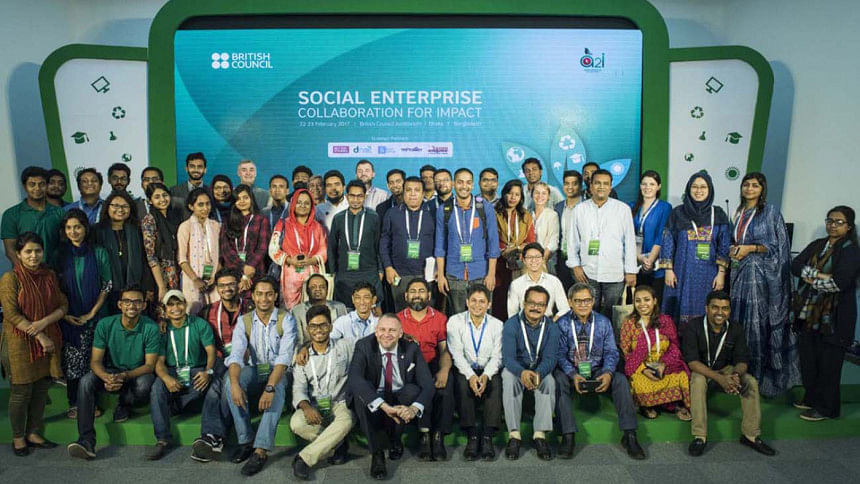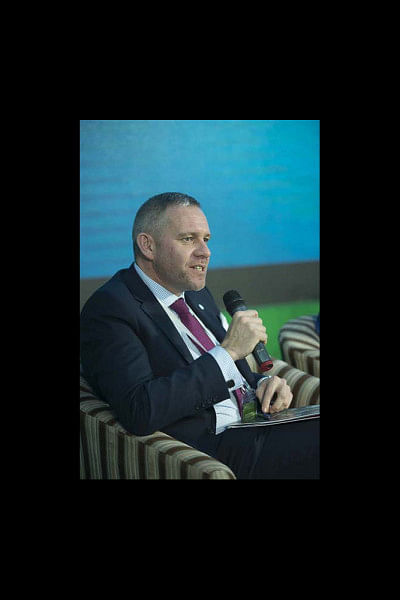Collaboration for Impact

Social Enterprise Policy Dialogue 2017
Set to reach middle income status by 2021, Bangladesh is at the crossroads of an economy in transition. That big donors may reprioritise towards least developed and developing countries is a reality we must be ready to face by making the right provisions for facilitating entrepreneurial activity. In light of this changing scenario and the unequal distribution of our growth till now, it is time to look towards sustainable models of delivering socially minded goods and services.
With this in mind, the British Council held the third Social Enterprise Policy Dialogue between February 22 and 23 to bring together national and international social entrepreneurs, development professionals, social investors, and policymakers to share and learn from experiences and to identify opportunities to boost the growth of social enterprise in Bangladesh.
As the British Council's recently published State of Social Enterprise survey has indicated, social enterprises are playing a promising role in addressing challenges faced by communities nationwide. There is greater youth and female leadership among social businesses compared to mainstream ones, and 32 percent of these ventures are addressing Bangladesh's critical skills gap. “This survey is an important step in remedying that knowledge gap that will inform the delivery of our social enterprise programme in Bangladesh, disseminate sector knowledge and best practice between the UK and Bangladesh and support our shared goal of building safer, more inclusive and prosperous societies,” said Barbara Wickham, Director of British Council Bangladesh, at the event.
The sector is in strong need of timely support and recognition, and its potential requires acknowledgment from the policymakers. Themed 'Collaboration for Impact', the dialogue will support the development of a social enterprise policy framework in Bangladesh and a nexus of policy influencers, entrepreneurs, academia and private sector specialists from East Asia, South Asia, and the UK. This year the event was organised in collaboration with the Access to Information (a2i) Programme of the Prime Minister's Office and key social enterprise actors in the country such as Better Stories, Dnet, futurestartup, mPower and team engine.

Taking a pro-social approach to business
A spokesperson for social enterprise and an accidental but avid serial entrepreneur, Peter Holbrook, keynote speaker at this year's dialogue and Chief Executive of Social Enterprise UK, shared the UK's policies and best practices around the sector. Social Enterprise UK is the British national body for social enterprise, which works to raise awareness of social enterprise, garner support from politicians, and work with private sector organisations that want to explore or consolidate their position in the growing social enterprise market. We spoke to him about how to better facilitate social enterprise in Bangladesh.
Even though the concept of social enterprise has been around for a while, there is still a lack of awareness or understanding about it. Given that one of the aspects of your work is to promote the benefits of social enterprise, how would you disseminate the concept to laymen who could be potential social entrepreneurs in a developing country like Bangladesh?
Principally, social enterprises are businesses, but they are businesses that have a primary social purpose, rather than a primary profit purpose. That social purpose is in the DNA, the fabric of the business. All the decisions that are taken are based on creating shared value. Value for the communities, for the staff, for suppliers, for the environment.
And, actually, there is increasingly not just a strong moral case for social enterprise, but a strong business case as well. I have found consumers that would come to us because we were a social enterprise. For example, I would never have had the opportunity to deliver all the catering services to Downing Street had it not been for that social purpose. The Prime Minister was keen to see a social business operate within Downing Street because he wanted to use the power of Downing Street's procurement to empower people and provide them with opportunities. So I think that for any social entrepreneur or any entrepreneur, there is strong business benefit in taking a pro-social approach.
What do you think are the biggest challenges that social enterprises face in Bangladesh as well as worldwide?
In Bangladesh, I would say the biggest challenge is that the government has not created an ecosystem or an environment where social enterprises are fully recognised. There are NGOs and there are private businesses. But a social enterprise is in between the two. And therefore, you need a supportive policy environment so you can benefit from accessing capital, building awareness about what you're doing and why you are doing it, and getting some grant funding to seed your businesses.
More broadly, I think all around the world there are three main challenges that all social enterprises face. One is the lack of awareness. So there is a big job to be done in terms of building awareness. In the UK, we are going to have a Hollywood actor, who has recently found social enterprise and believes it will be able to nourish and improve the community where he came from, come out and support social enterprise.
Secondly, the issue is access to capital. Where do you get the money to invest and start these businesses? Traditionally the capital markets and banks are after profit maximisation and social enterprises obviously sometimes choose to create social benefit rather than maximise profit.
And then thirdly, lots of social enterprises work in areas in which the government also delivers, like education, health, social care. But public procurement often favours large businesses rather than small ones and social enterprises. Thus, these smaller businesses struggle to get the same opportunities to trade with the government that large corporates do.
What do you think social entrepreneurs themselves must do to facilitate and move ahead with their work?
They need to create their own ecosystem. And that means coming together, staying together, and working together. There is a huge amount that can be done with social enterprises trading with each other, nourishing each other's businesses and building partnerships.
Secondly, there is a real need to speak with one voice. Often, if you speak to five different social entrepreneurs, you will get five different ideas about what the government should do. What is important is that you come together. So you need a Social Enterprise Bangladesh that's driven by social entrepreneurs to create a common voice and clarity of action that can be used for engagement with corporates, the government, universities and schools, etc.

 For all latest news, follow The Daily Star's Google News channel.
For all latest news, follow The Daily Star's Google News channel. 



Comments